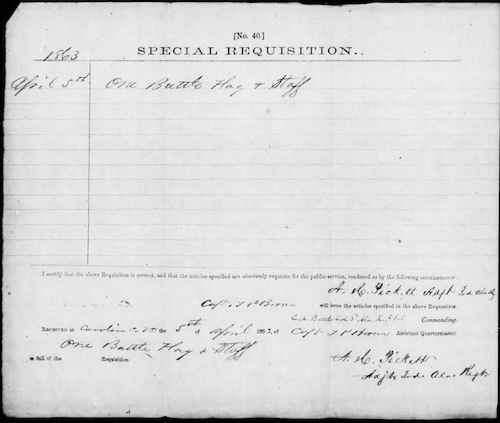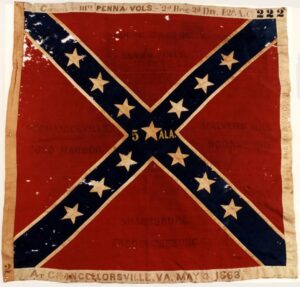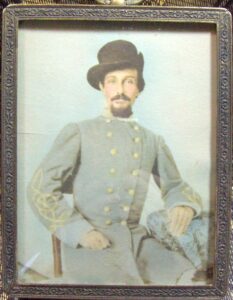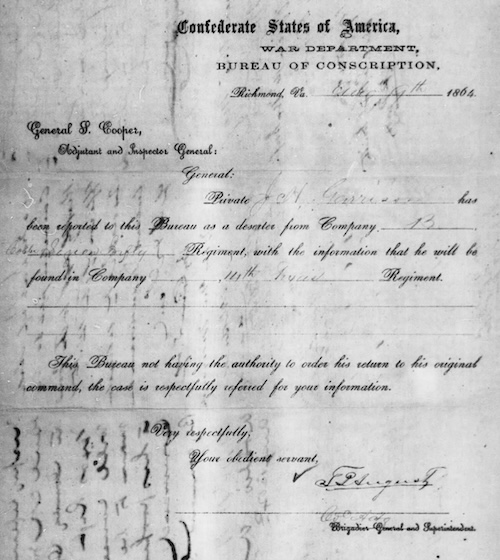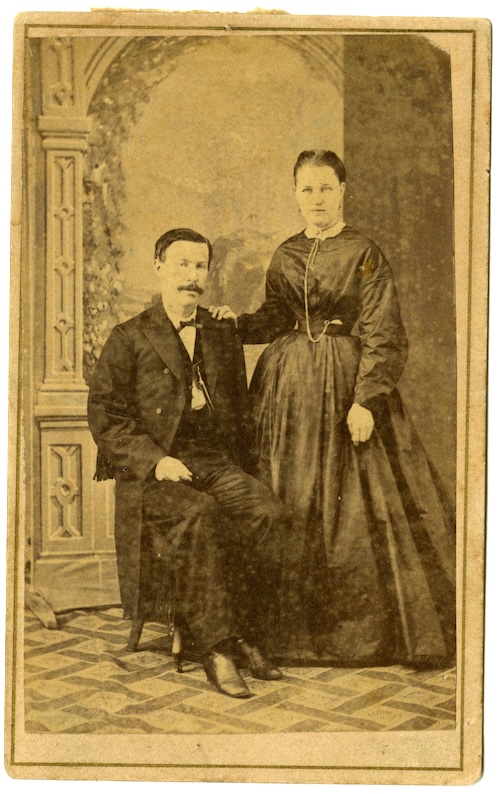CSA battle flag requisition (1863)
4 January 2026
Lieutenant Alexander H Pickett, Adjutant of the 3rd Alabama Infantry submitted this request and signed for receipt of a new battle flag and staff on 5 April 1863. It appears that most or all of the regiments of General D.H. Hill’s Division were supplied with new wool bunting “3rd issue” flags from the Richmond (VA) Depot that month.
By way of illustration, here’s the flag issued to the 5th Alabama that month – the 5th Alabama was brigaded with the 3rd regiment and they served together through the war. Their flags would have been very similar. You’ll note the names of some of the regiment’s engagements prior to that April, including Boonsboro (Turner’s Gap on South Mountain) and Sharpsburg.
And here’s Pickett, in the uniform of Captain and Assistant Adjutant General to Brigadier General Cullen Battle in about August 1863.
Notes
The requisition is from Lt Pickett’s Compiled Service Records (CSRs) in the National Archives. This copy online from fold3.
The 5th Alabama’s flag is in the collection of the Alabama Department of Archives and History in Montgomery.
The Pickett portrait was posted to his Findagrave memorial by user El Mero in 2015.
A sad coincidence
20 December 2025
On 19 August 1864 the Confederate Conscription Bureau in Richmond, VA sent a notice to the Army’s Adjutant General that Private J.H. Garrison was considered a deserter from Company B of Cobb’s Legion Infantry Battalion and was thought to be in the 14th Texas. The Bureau had no direct authority to return a soldier to his regiment, so sent the notice to General Cooper for action.
On the same day, about 500 miles away in Atlanta, GA, then Quartermaster Sergeant John H. Garrison of the 14th Texas Cavalry was killed by enemy artillery during the siege of that city.
Late of Rusk County, TX, Garrison had enlisted in Cobb’s Legion in Bowdon, GA in July 1861, was wounded on the Maryland Campaign of September 1862, and was sent home on wounded furlough by that November. In January 1863 he enlisted in Rusk County in the 14th Texas Cavalry, and was detailed to assist his brother Zed, the regiment’s Quartermaster. Both men were in Atlanta looking for clothing when John was killed.
On about 8 October 1864 that notice reached senior Captain N.S. Allen, then the commanding officer of the 14th Texas Infantry, who replied that there was no one of that name in his unit …
Notes
That document is among John Garrison’s Compiled Service Records at the National Archives. I got my copy online from fold3. Here’s my transcription of it:
Confederate States of America,
War Department,
Bureau of Conscription,
Richmond, Va. Aug 19th 1864
[to]
General S. Cooper,
Adjutant and Inspector General:
General:
Private J.H. Garrison has been reported to this Bureau as a deserter from Company B, Cobbs Legion Infty Regiment, with the information that he will be found in Company ___, 14th Texas Regiment.
This Bureau not having the authority to order his return to his original command, the case is respectfully referred for your information.
Very respectfully,
Your obedient servant,
[signature] L P August [?]
Col Actg Superintendent
J.N. Henderson’s empty sleeve (1864)
4 December 2025
Son of a prosperous planter, John N Henderson was 18 years old in July 1861 when he enlisted as a Private in Company E of the 5th Texas Infantry in Washington, TX. He was not yet 20 when he was shot in the left arm in combat at Sharpsburg on 17 September 1862. He lost his arm above the elbow to amputation and was sent home, disabled for further field service.
In October 1864 Brigadier General J.B. Robertson, commanding state reserve troops in Texas, appointed John to his staff as a Captain and Aide-de-Camp; the uniform he’s wearing above.
After the war Henderson was a successful lawyer, district attorney, state senator, and judge in Texas. Here he is in about 1868 with his first wife, the former Hester Hubert:
Notes
Both of these excellent photographs [top, below] are online in the Tennessee Virtual Archives collection. There are at least two more photos of John in that collection: one taken at about the time he enlisted in 1861 and one dating from about 1894, when he was appointed a judge on the Texas Court of Appeals in Austin.
